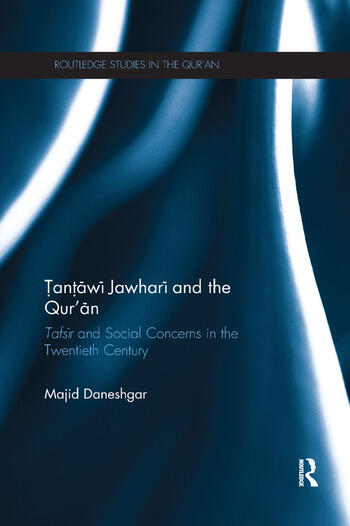Book Review: Tantawi Jawhari and the Qurʾan: Tafsir and Social Concerns in the Twentieth CenturyThe French Orientalist Carra de Vaux (1867-1953) in his 1926 Penseurs de l’Islam (5:275-284) had assessed Ṭanṭawi b. Jawhari (1863-1940, hereafter TJ) as an erudite translator of Western science, a Utopian advocate of universal peace and a political philosopher who was ‘completely innovative, very modern, all so original... and skilful’ in representing the Qurʾan as a seedbed of modern natural science. Similarly the German Arabist Martin Hartmann (1851-1918) and the Ayatollah Khomeini (1902-1989) had expressed that TJ was much more concerned with socio-cultural activism than exegesis. Junior Fellow at the Freiburg Institute for Advanced Studies Majid Daneshgar builds on these and other assessments in his timely, all-too-brief book Ṭanṭāwī Jawharī and the Qurʾan to show that TJ promoted the idea that virtually all the major trends and discoveries of Western science are ‘explicitly expressed’ in the Qurʾan and other Islamic texts or at least primarily based on knowledge taken from Muslims—including Darwinism, spiritism, and Einstein’s theory of relativity (pp. 33, 64, 81) but not feminism (p. 65). The Egyptian physician and scholar Muḥammad b. Aḥmad al-Iskandarani (d. 1889) had preceded him in taking the borrowed-knowledge stance in his three-volume Kashf al-asrar al-nuraniyya al-Qurʾaniyya fīma yataʿallaq bil-ajram al-samawiyya wal-arḍiyya wal-ḥayawanat wal-nabatat wal-jawahir al-maʿdaniyya (Revealing the luminous Qurʾanic secrets pertaining to the celestial and terrestrial bodies, animals, plants, and mineral substances) (p. 76), although TJ’s teacher Muḥammad ʿAbduh (1849- 1905) probably influenced him more.
|
Gibril Haddad
|
|
© Center for Islamic Sciences. All Rights Reserved.
Designed and Developed by Crescent Marketing Solutions |


